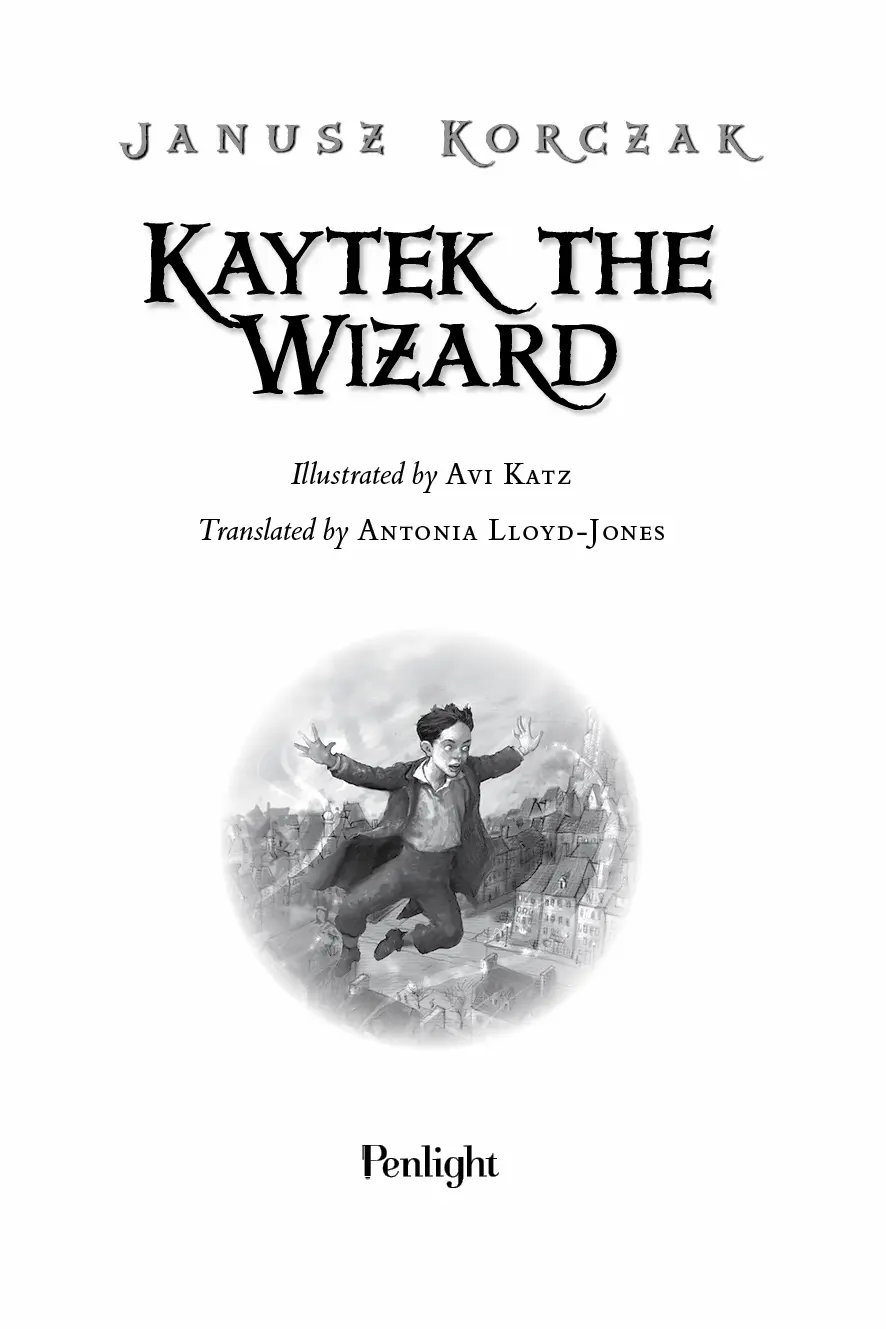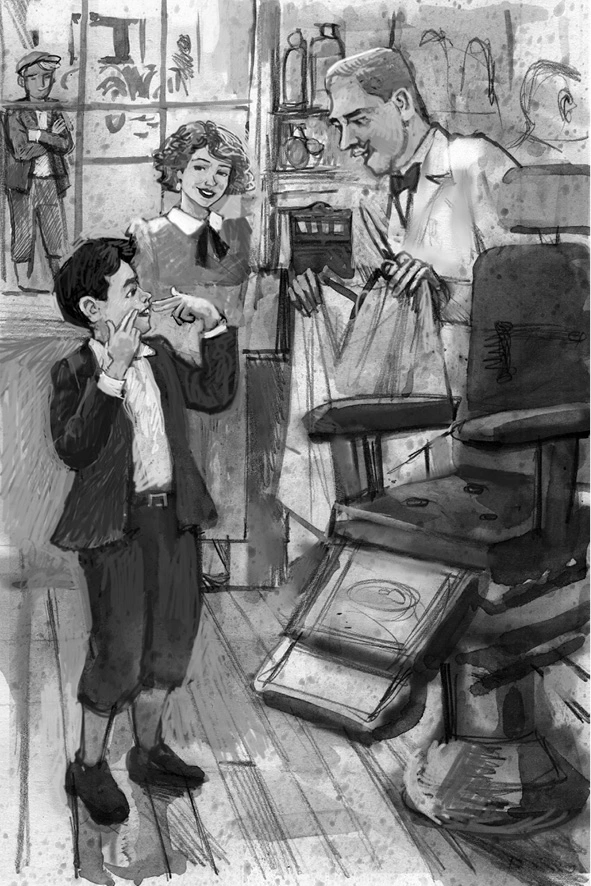Kaytek the Wizard

Kaytek the Wizard
by Janusz Korczak
Translated by Antonia Lloyd-Jones
Originally published in Polish as Kajtus´ Czarodziej in 1933
Illustrations by Avi Katz
English Translation Copyright © 2015, 2012 by Penlight Publications
Copyright © by The Polish Book Institute
Illustrations Copyright © 2015, 2012 by Penlight Publications
All rights reserved. No part of this book may be used or reproduced in any manner whatsoever without written permission from the copyright owner, except in the case of brief quotations embodied in reviews and articles.
This is a work of fiction. Names, characters, places and incidents either are the product of the author's imagination or are used fictitiously, and any resemblance to any actual persons, living or dead, events or locales,
is entirely coincidental.
This publication has been subsidized by The Polish Book Institute –
the © POLAND Translation Programme.

ePub ISBN 978-965-524-239-3
Mobi ISBN 978-965-524-240-9
PDF ISBN 978-965-524-241-6
(Hardcover ISBN 978-0-983868-50-7)
Cover design by the Virtual Paintbrush.
Cover illustration by Avi Katz.
ePub creation by Ariel Walden.
Library of Congress Control Number: 2012938698
Penlight Publications
527 Empire Blvd., Brooklyn, New York 11225 U.S.A.
Tel: 718-288-8300 Fax: 718-972-6307
Distributed by IPG
www.PenlightPublications.com
Author’s Dedication
This is a difficult book.
I dedicate it to all the restless children,
those who find it hard to change and improve.
You have to want to change, very much and very deeply.
You need to strengthen your will power.
You need to play a useful role in life.
Life is strange and mysterious.
Life is like an extraordinary dream.
Whoever has the will power and a strong desire to serve others,
his life will be like a beautiful dream,
even if the path to his goal was difficult,
and his thoughts were restless.
Maybe one day I will write the ending to this book.
– Janusz Korczak
Kaytek the Wizard
Chapter One
Kaytek likes to make bets – Kaytek goes into stores and pretends he wants to buy something, though he doesn’t have a penny
“And so what?”
“So nothing.”
“Don’t you believe me?”
“No, I don’t.”
“Then make a bet.”
Kaytek likes to make bets with his friends.
“If I win, you’ll pay for us to go see a movie.”
“All right, it’s a bet.”
“Let’s shake on it. Don’t forget: a movie on Sunday.”
“But wait a minute . . .”
“See, you’re chickening out already.”
“No I’m not, I just want to know how it’s going to work.”
Kaytek repeats: “I’m going to go into ten stores. I’m going to pretend I want to buy something even though I haven’t a cent in my pocket.”
“You said twelve stores . . .”
“All right, twelve.”
They make the bet.
So he’ll go into each store, as if to buy something.
It’s the final class of the day.
And here’s the final bell.
They’ve packed their schoolbags.
Caps on their heads.
“So we’re off?”
“We’re off.”
Down the stairs and into the schoolyard.
Then through the gate.
And they’re in the street.
“I’m going to stand outside the store.”
“Whatever you like. Just don’t laugh in the window or they’ll guess it’s a joke.”
The first store is a pharmacy.
Kaytek goes inside.
The pharmacist is dispensing the medicine very slowly so he won’t make a mistake. Kaytek patiently waits his turn.
“What’ll it be, little guy?”
“Two exercise books please, one checkered, and one blank for drawing.”
“I haven’t any for drawing – they all have a checkered career,” jokes the pharmacist.
“Oh well, sorry.”
Kaytek bows politely.
A gentleman feels sorry for him and says: “Go to the right, next door. You’ll find them in there.”
“Thank you.”
He bows again and leaves.
He tells his pal what happened.
Next to the pharmacy there’s a store selling stationery and teaching aids.
Kaytek goes in.
He looks around.
“A cream cake, please.”
“What?”
“I want a chocolate cake with cream.”
“Are you blind? Can’t you see?”
“Sure I can see.”
Kaytek stands there, looking as if he can’t think what the problem is.
“Do you go to school?”
“Yes.”
“Don’t you know where to buy cakes?”
“They haven’t taught us that yet,” he replies, shrugging his shoulders, as if he doesn’t know what to do.
The man loses his temper.
“What are you waiting for?”
“Nothing.”
And he leaves.
“Well?” asks his pal.
“He got riled up. A grouchy kind of guy.”
“He’s always like that,” says the pal. “I know this store. I never buy anything here.”
“You should have said.”
“I thought you’d do all right.”
“And I did. He didn’t kill me, did he?”
They walk on.
Kaytek boldly enters a third store.
It’s a food store. They have cheese, butter, sugar, herring, and whitefish.
“Good day.”
“Good day.”
“Can I have some whale?”
“Whale?”
“Yes. Four ounces. Pickled.”
“So who sent you?”
“A friend. He’s waiting outside.”
“Tell your friend he’s a rascal, and you’re a dope!”
“So you don’t have any?”
“No, we have not. We’ll have it later.”
“When will that be?”
“When it gets warmer. That’s enough now, beat it! And shut the door.”
He carefully closes the door and tells his pal what happened.
“Aren’t you afraid he’ll recognize you in the street?”
“So what? They sell sea salmon. Herrings are from the sea too. What’s wrong with asking about whales?”
“Just you wait. That’s only three stores. You can still lose.”
“We’ll see.”
The fourth is a tiny little store.
It’s a shoemaker’s shop.
The shoemaker doesn’t have any work right now.
It’s already the dinner hour and he’s only sold a pair of laces and a can of shoe polish today.
He’s waiting for someone to buy something.
In comes Kaytek.
“I’d like some cream cheese, please.”
Either guessing it’s a joke or because he’s angry at being disturbed, the shoemaker reaches for his belt.
“I’ll give you cheese, you clown!”
He takes a swing.
This time it hasn’t quite worked – Kaytek has had to make a quick escape.
Kaytek passes by several small stores.
He stops outside the barbershop and does some thinking.
“But you keep doing the same thing,” says his pal. “There’s nothing smart about that.”
“No, not if you don’t find it amusing. But you go in and try thinking up something different yourself.”
“All right then. What will you say in here?”
“Don’t be in such a rush. Just wait a bit. You’ll see.”
Kaytek goes into the barbershop.
It’s nice in there, clean and fragrant.
There are perfumes in lots of different bottles, as well as colored soaps, combs, hair oil, and powder.
The girl behind the cash register is reading a book.
“What would you like, young man?” asks the barber.
He’s young and chirpy.
“Some hair oil to grow a king’s moustache, please.”
“Who is it for?”
“It’s for me.”
The girl stops reading and looks up.
The man opens his eyes wide.

“What do you want a moustache for?”
Kaytek puts on an innocent look and says:
“For a show at school.”
“So who are you going to be?”
“King John Sobieski.”*
“I can paint a moustache on you.”
“I’d prefer a real one.”
“But what’ll you do after the show?”
“I’ll shave it off.”
They laugh.
They’ve fallen for it.
“Give him some Eau de Cologne.”
“I don’t want any,” says Kaytek, flinching.
“Why not? It’ll make you smell good.”
“I don’t want any. The boys will laugh at me. They’ll say I want to get married.”
“Don’t you want to get married?”
“No way. What the heck for?”
The young people in the store are bored, so they’re happy to joke around.
But a lady comes in to buy something and interrupts the conversation.
“Come here and I’ll paint you a moustache.
1 comment